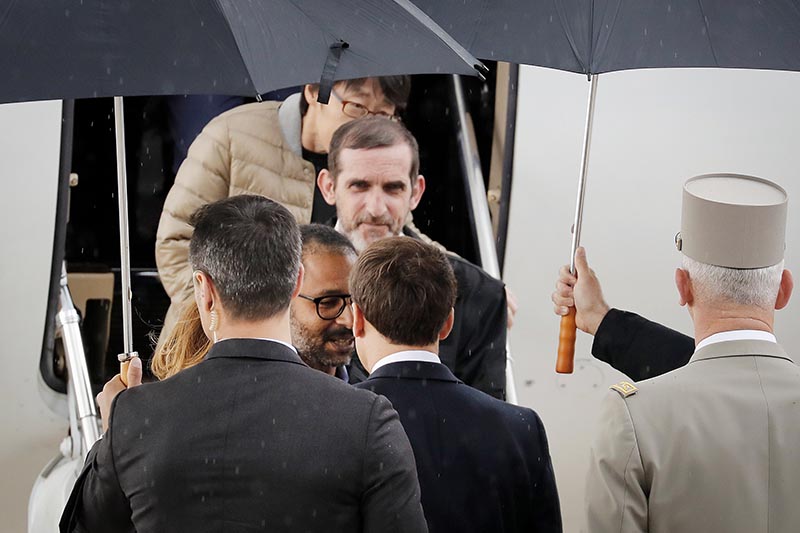French military frees hostages in Burkina Faso, 2 commandos killed
- US, South Korean, French nationals freed
- Rescue carried out at night
- France intervened militarily in 2013
- Sahel region hit by spike in militant violence
PARIS: French commandos rescued four foreign hostages including two French citizens from a militant group in Burkina Faso, France's military said on Friday, adding that two of the elite soldiers were killed in the night-time operation.
French special forces carried out the raid under cover of dark over the night of Thursday-Friday, supported by US intelligence and troops from France's Barkhane operation deployed in the Sahel region to counter Islamist militants.
All four hostages were safe, President Emmanuel Macron's office said, adding that a US woman and a South Korean woman were also freed in the covert operation.
"The precise and determined actions of French soldiers allowed us to take out the kidnappers while protecting the lives of the hostages," France's army chief Francois Lecointre told a news conference, describing the militant group as "terrorists".
Four kidnappers were killed and two escaped, he said.
"Those who attack France and the French know that we will spare no effort to track them and take them out. We will never abandon our citizens," Armed Forces Minister Florence Parly told reporters.
The French forces had not been aware of the presence of the US and South Korean hostages ahead of the operation and they had been held for 28 days, Lecointre said.
"We were not aware of their presence ... the American will be repatriated separately," Parly said.
"The contacts (with those countries) show that these countries were not necessarily aware of their presence."
A spokeswoman for the US State Department said the United States was grateful for the successful recovery of the hostages, including a US citizen, and offered condolences to the families of the two solders killed.
"The successful operation demonstrates the importance of our historic alliance with France. We reaffirm our solidarity with the people of Burkina Faso and Benin in the face of these threats," she said.
South Korea had confirmed the identity of the South Korean hostage, a woman in her 40s, its foreign ministry said.
South Korea offered condolences to the families of the soldiers killed and was sincerely grateful to France for the rescue, the ministry said.
France, the former colonial power in the region, intervened in Mali in 2013 against Islamist militants then occupying Mali's northand has since kept about 4,500 troops in the Sahel.
The region has seen a spike in violence by militants linked to al Qaeda and Islamic State in past years, highlighting the difficulty international partners face in restoring stability.
France's defence ministry identified the fallen soldiers as two elite naval commandos.
Burkina Faso's President Roch Kabore hailed the hostages' release and offered condolences to the soldiers' families.
"The joint military intervention that allowed us to achieve these results shows our common engagement in fighting against the forces of evil," Kabore said in a Facebook post.
SPREADING INSTABILITY
The two French tourists were kidnapped on May 1 in Benin's Pendjari National Park, which lies on Benin's northern frontier with Burkina Faso. Their safari guide was found dead, his body riddled with bullets, and their vehicle burned.
The French government had warned its citizens against travelling to parts of Benin near the Burkina Faso border because of the risk of kidnapping.
Swathes of northern and eastern Burkina Faso have been overrun by militants, leaving the government struggling to assert authority and forcing over 100,000 residents to flee.
In February, Burkina Faso said militants were increasingly active in West Africa and instability in the Sahel was spreading to coastal countries such as Benin and Ivory Coast.
Led by France, Western powers have also provided funding and weapons to a regional force made up of soldiers from Mali, Niger, Burkina Faso, Chad and Mauritania to combat jihadists.
But the so-called G5 force has been hobbled by delays in disbursing the money and poor coordination between the five countries, while insecurity has escalated in the border region between Mali, Niger and Burkina Faso.






